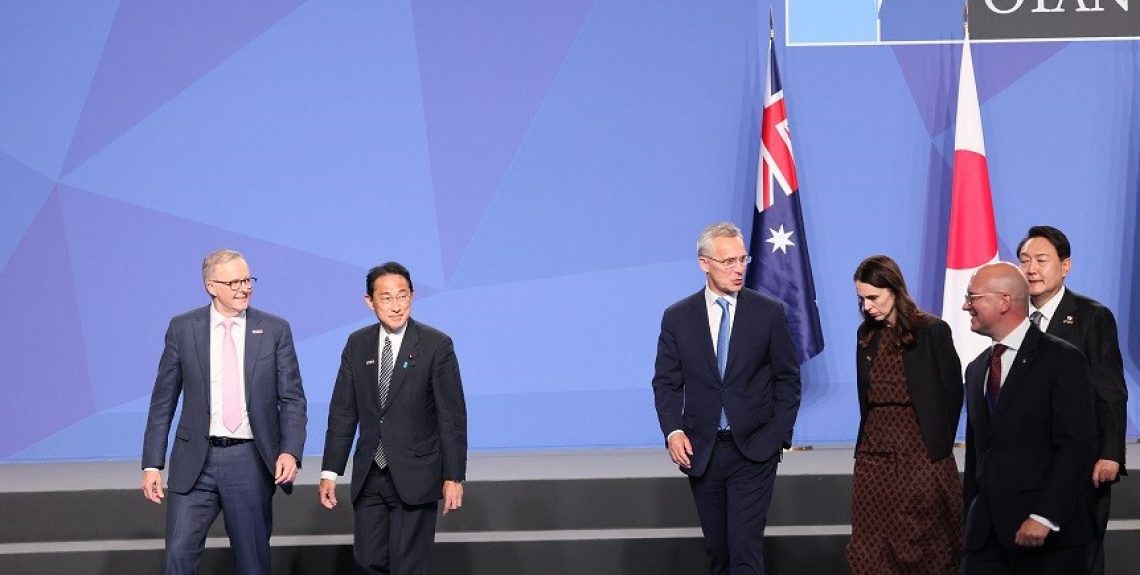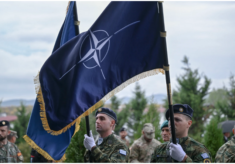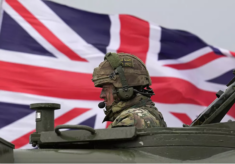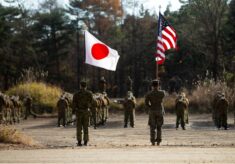Keynote speech at the 2023 Yushan Forum, 12th of October 2023
by Ambassador Alessandro Minuto-Rizzo (President, NATO Defense College Foundation)
We live in a world that is very different from the traditional one we have been accustomed for a long time, where change is fast, new threats and opportunities may surprise us, the multilateral system is more strained than in the past.
What is also new is the number of actors on the international scene. From an historical point of view there were a few main actors, usually in the North hemisphere and interplay was visible according to simple criteria. Today we see many voices that want to be heard. We live in an everybody’s world where there is little governance and where the search for peace and security is not easy. Peace and stability are the most important objectives to aim to, and security providers are in short supply.
This complex world demands a very different approach, one that has been aptly resumed in the cat metaphor of one of your famous female diplomats, meaning the need for balance, agility, flexibility and prudence.
The Atlantic Alliance and the European Union are leading security suppliers that prefer deterrence, dialogue and prevention, instead of rushing blindly into confrontation, escalation and ultimately disastrous wars. They are very often recalled, but not many are aware of their real functioning and their structure. This is especially important today, since a major war has broken out in Europe calling for unprecedented actions to defend European and global security and to strengthen a geopolitical posture.
NATO and its characteristics
Looking at the basic features of NATO, the founding treaty written in 1949 is only one or two pages long. It is a political-military organization, in this order, based on the political will of its members to do certain things together. In this respect it is very different from the European Union, based on detailed texts evolved along the years.
NATO has a minimal common budget because it is an alliance in the traditional sense, its most important activities are financed directly by nations. It means that every nation takes its responsibilities and has to pay for the role it wishes to have.
This approach differs from the basic principles of the European Union, based on a big common budget where nations draw resources. In other words, NATO has no pretension to be supernational, the governments are really the owners of the organization. The consequence is that consensus is very important, in fact it is the only form of decision making; voting is not in use. Consensus, and not strong-arm tactics, is the daily basis for decision making in the Alliance, a body where even the smallest member has his say in a simple system of balances that keeps freedom within the organisation. In fact, our Latin motto during the deliberations in the North Atlantic Council is “Animus in consulendo liber” (A free spirit in deliberations).
So, in conclusion political will is the real nature of the Alliance. The military side is not governing and is clearly under civilian rule. Namely in the first instance the North Atlantic Council.
The real guide to the functioning of NATO is the Strategic Concept. It is useful a resume of the main tasks of the Organization and a reflection on the strategic objectives. It is revised every ten years or so and the present one has been adopted a year ago at the Madrid Summit.
For over 70 years the Strategic Concept has assured the security of Allied countries, but its adoption in an updated version comes at a critical moment for international peace and stability. Without doubt the priority is now identified in the resolve against the aggression of the Russian Federation on Ukraine: an invasion that violates international law as well as international humanitarian law.
The overall purpose remains ensuring collective defence, based on a 360-degree approach. The new Strategic Concept underlines that national and collective resilience is critical to all the core tasks. Those three core tasks remain the traditional ones: defence and deterrence, crisis prevention and crisis management, and finally cooperative security connecting with different parts of the world.
First of all, it remains the essential transatlantic forum to consult and coordinate on matters related to common issues of security. The strategic environment is not good, quite the contrary, especially because the Russian Federation has violated the principles that are at the basis of a predictable and viable European security order. To be noted that NATO does not seek confrontation and does not seek to pose a threat.
Besides this first note, terrorism is an asymmetric threat to security, to peace and prosperity. We see non- state groups and terrorist networks that are active in various areas to exploit conflicts and weak governance. Fragile institutions, food insecurity and other emergencies affect the situation in the Middle East, North Africa and the Sahel region. Increased instability is a distinct possibility, Ladies and Gentlemen,
The Strategic Concept notes that the People’s Republic of China uses a lot of tools – political, economic and military – to increase its global footprint. It is potentially dangerous, but NATO remains open to a dialogue, including to build reciprocal constructive transparency.
The task of “Deterrence and Defence” is based on a mix of conventional, space and cyber capabilities. It is defensive and fully in line with international commitments.
Another important area covered by the strategic concept is the one of high technologies: they bring both opportunities and risks, since they acquire greater strategic importance and are becoming key elements in the global competition.
The strategic concept lists a number of other objectives, like maritime security, as key to peace and prosperity: digital transformation, resilience against military and non-military threats as a collective commitment, strategic stability, fight against terrorism.
The second basic goal consists in the anticipation and prevention of crises and conflicts. It includes human security and the protection of civilians. It has to be kept in mind that NATO has a long experience and expertise acquired in seven decades of management of these and related risks. Coordination and cooperation with the United Nations, the European Union and other regional organizations will be reinforced.
Cooperative security is also a fundamental task. It is clear that the open-door policy has been a success, but partnerships are important. Political dialogue and practical cooperation, based on mutual respect, contribute to stability. Partnerships are crucial to protect the global commons and uphold the rules-based international order. Partners can contribute to crisis management and the Alliance has the objective to ensure engagement and interoperability with partners who express an interest in contributing.
The European Union: an evolving partnership
The European Union is unique and has a special place, because NATO allies and EU members share the same values and almost the same membership. They play complementary and mutually reinforcing roles for the cause of international peace and security.
This strategic partnership will be enhanced through political consultations and other means on issues of common interest and in order to face emerging threats. In particular, NATO recognizes the value of a stronger European defence.
The Western Balkans and the Black Sea are of strategic importance, while other areas traditionally relevant are the Middle East, North Africa, the Sahel region.
The Strategic Concept refers also to the Indo-Pacific. It is an important region for NATO, given that developments in that region can directly affect Euro-Atlantic security. The stated intention is “to strengthen dialogue and cooperation with new and existing partners in the Indo-Pacific, to tackle cross-regional challenges and shared security interests.
The Vilnius Summit
The Summit of Heads of State and Governments which took place in Vilnius in July has reaffirmed that allies are bound by shared values of individual liberty, human rights, democracy and the rule of law, underlining that it takes place “at a critical time for our security and international peace and stability”.
It is no surprise that the bulk of the final communique is focused on the threat coming from the Russian Federation, after its unprovoked, illegal and unjustifiable aggression of Ukraine. The Russian Federation represents at present the most significant and direct threat to Allies security and to peace and stability in the Euro-Atlantic region. It also says that UE-NATO cooperation has become more significant in the context of Russia’s war of aggression against Ukraine
On the other hand, conflict, fragility, instability in Africa and the Middle East directly affect global security. The final communique adds that the stated ambitions and coercive policies of the People’s Republic of China “challenge our security, interests and values”. But NATO remains open to constructive engagement with the PRC, “including to build reciprocal transparency, with a view to safeguarding the Alliance’s security interests”.
Without going into further details, it has to be noted that the Indo-Pacific is important in many ways, given that developments in the region can directly affect Euro-Atlantic security. The contribution of partners in the Asia- Pacific region are welcome, namely those of Australia, Japan, New Zealand and the Republic of Korea.
Dialogue and cooperation will be further strengthened to tackle shared security challenges, underpinned by a shared commitment to upholding international law and the rules-based international order.
Coming to a conclusion on the relevant features of the Atlantic Alliance, we can say without doubt that it is an organization of success. 12 Nations signed the Washington Treaty in 1949. A number of enlargements have followed and the present membership is of 31 nations. To these countries you have to add thirty-nine partners around the world with different formats and arrangements.
The Alliance has evolved along the years adapting to the new circumstances and just before the war in Ukraine was engaged in a process of reform called NATO 2030. The first target regarded the political aspect, meaning improved consultation and decision-making, identifying priorities, discussions about relevant security matters and the best use of resources. I repeat that, before having a military component, NATO is a political alliance. It is a process that will go on and it is gearing up towards the next Summit in Washington, in July of next year, marking its 75th Anniversary.
A few words about the European Union’s security component
The European Union has evolved over the years in a number of treaties and in recent years it has added and developed its security dimension, adopting what is called a “Strategic Compass for Security and Defense”.
It details how the Union and its member states will strengthen this dimension. The ambition is to become a more assertive security provider, better prepared to face threats and challenges.
The starting assumption is that the world is changing rapidly and drastically. A major war has broken out in Europe asking for immediate and unprecedented actions, defending security with willing partners. It was unforeseen, unwanted and the unjustified aggression Russia has obliged the EU to show an unprecedented resolve to restore peace in Europe. Resilience, ensured solidarity and mutual assistance are therefore primary objectives.
For the Indo-Pacific region, the basis of the relationship is the EU strategy for cooperation that was adopted two years ago. It is clearly stated that the European Union wishes to increase its engagement with the region, to build partnerships that reinforce the rules-based international order. An engagement based again on promoting democracy, the rule of law and human rights. This is a strong basis for a mutually beneficial relationship.
The decision identifies seven main priorities areas for concrete European actions: sustainable and inclusive prosperity; green transition; ocean governance; digital partnerships; connectivity; security and defence; human security.
There is a long list of proposed actions. It is evident however that an engagement of the European Union with Indo-Pacific partners is already under way and is going to become more concrete in an evolving context. I give the example of the objective to build more resilient and sustainable global value chains, by diversifying economic relations, by developing technological standards and regulations there are in line with EU values and principles.
In this line of thought I think that is also worth to have a look at the last Summit of the European Union on the 29-30th of June 2023.
Among other issues there is a reference to Security and Defence. The European Council recalls here the need to strengthen the technological and industrial base of the European defence sector, in a new strategic environment requiring defence readiness and a significant increase in its capacity to take more responsibility for its own defence.
The European Council also concluded reaffirming the EU multi-faceted approach towards China, since it has to interact simultaneously with a partner, a competitor and a systemic rival. The language that is used looks at the future in a balanced way around those three concepts. It is clearly an evolving attitude calling for an engagement to be verified in next few years.
The EU and Taiwan
From an overall point of view the European Union and Taiwan have developed a good relationship: yearly commercial consultations take place, as well as a dialogue on industrial policy and on digital economy. Taiwan is number four or five as a commercial partner in Asia. The European Parliament for its part has formally addressed relations with Taiwan in a positive spirit, recognizing it as a functioning democracy and a potential partner for increased cooperation.
Coming to the conclusion there seems to be a consensus in Euro-Atlantic institutions that Taiwan has a vibrant civil society, a cutting-edge economy and adopts a proactive pragmatism as a general line of action. It also acts as a responsible stake holder in the Indo-Pacific region, charting a course between extremes, open to dialogue and de-escalation of tensions, willing to work in an Asian multilevel concrete environment.
There is surely the possibility to cooperate towards the common good at global level by avoiding dangerous escalations and working together at UN-level and more limited formats to tackle evident global challenges that outpace the capabilities of single nations or groups of countries. EU and NATO will surely contribute also at this wider level.
NATO and the EU, are in the end following quite closely what has been appropriately expressed by President Ing-Wen Tsai: “We will do everything in our power to make sure cross-strait stability becomes the driving force for peace in the Asia-Pacific region”.
Alessandro Minuto-Rizzo
President of the NATO Defense College Foundation






























